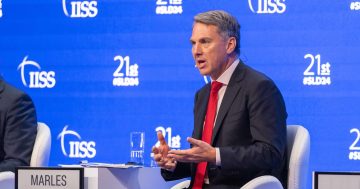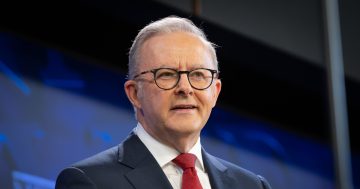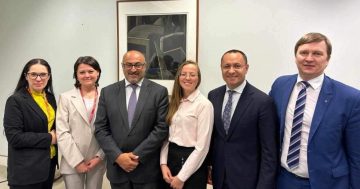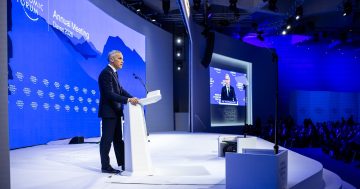Franklin D. Kramer and Hans Binnendijk* say China’s bullying of Lithuania deserves a firm response both from the European Union and NATO.
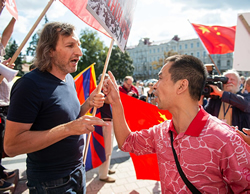 China has put NATO ally Lithuania in the crosshairs over that nation’s relationship with Taiwan and its challenge to China’s efforts to gain a political foothold in Central and Eastern Europe.
China has put NATO ally Lithuania in the crosshairs over that nation’s relationship with Taiwan and its challenge to China’s efforts to gain a political foothold in Central and Eastern Europe.
Lithuania’s challenge to China is twofold. First, the Baltic country authorised Taiwan to open a representative office in Vilnius, to be called the Taiwanese Representative Office in Lithuania. Then it announced plans to open a reciprocal office in Taipei by the end of the year.
China objects to the use of the word ‘Taiwanese’ in the name of the office in Lithuania.
However, such usage does not contradict the One China Policy that Europe and the United States follow.
Neither office is an embassy, nor does opening the offices imply recognition of Taiwan as a sovereign State.
The United States has a similar American Institute in Taiwan, which is a Government-sponsored private entity staffed by State Department officials and carrying out diplomatic functions.
Many other nations have similar arrangements.
Lithuania’s second challenge to China was to withdraw this year from the so-called 17+1 cooperation agreement between China and Central and Eastern European countries.
That informal arrangement promised Chinese infrastructure investments in the region, but was increasingly used by China to maximise its diplomatic influence.
Beijing has retaliated by recalling its ambassador from Vilnius, limiting trade, and suspending rail service between the two countries.
While the economic impact on Lithuania is thus far limited, diplomatically it is a wake-up call for the remaining European members of the now 16+1 — and indeed for all of Europe.
These actions are consistent with other examples of China’s increasingly strident approach to diplomatic relations.
Australia’s trade with China has suffered as a result of calling for a review of the origins of COVID-19; European officials and private entities have been sanctioned for highlighting China’s human rights violations in Xinjiang.
China’s harsh approach has even undercut cooperation on issues such as climate change, where a worldwide response will be required.
Lithuanian Foreign Minister, Gabrielius Landsbergis has urged European unity in the face of Chinese retaliation.
“From our perspective, it is high time for the European Union to move from a dividing 16+1 format to a more uniting and therefore much more efficient 27+1,” Mr Landsbergis said.
“The EU is strongest when all 27 member States act together along with EU institutions.”
Lithuania is correct to call for solidarity in dealing with China, but that solidarity should go beyond just the EU to include the entirety of the trans-Atlantic nations and cooperation where possible with Asian partners.
The response should be comprehensive, including diplomatic, economic, security, and institutional elements.
Diplomatically, nations with ties to Taiwan should explicitly include that word in the titles of their representative entities and should allow Taiwan reciprocal usage. The United States is apparently considering such a change.
A wholesale change would undoubtedly precipitate a negative reaction from Beijing, but this can be done without implying Taiwanese independence or sovereignty, as the use of the name can be coupled with a reiteration of the One China Policy.
Such a move would convey to China the degree of unity behind the need to settle the Taiwan issue peacefully.
A second diplomatic effort should be for EU members of the 17+1 to withdraw from that enterprise. Lithuania’s point is entirely well taken: A common EU approach to China is necessary.
Several economic measures need to be considered as well. The Comprehensive Agreement on Investment between the EU and China, which is now on hold due to Chinese sanctions against members of the European Parliament, should be put on further hold.
Indeed, the Lithuanian dispute is one further argument in favour of those in Europe who prefer to see the agreement permanently abandoned.
The newly-formed EU-US Trade and Technology Council should also be used to counter China’s assertive policies, such as subsidies that allow Chinese entities to undercut the pricing of Western firms.
In addition, the EU is considering a new legislative instrument designed to deter and counteract coercive actions by third countries taken against the EU or its member States.
This would allow the EU to retaliate by enacting trade, investment, and other policy measures against the country responsible.
Should this instrument be created, the United States might act with the EU to amplify the deterrent impact.
Trans-Atlantic nations also need to enhance their resilience against ongoing Chinese cyber-espionage and increase the costs to China of such actions.
A third cluster of issues that need trans-Atlantic attention relates to security.
China’s posture toward Lithuania is consistent with its increasingly assertive behaviour toward Taiwan and in the South China Sea. NATO is now focusing on Asia more than it ever has, but more still needs to be done.
NATO should form a new partnership with willing Asian partners negatively impacted by China, which could include those with ongoing relationships such as Japan and others such as India.
This new ‘NATO-Asia Forum’ would include liaison offices, centres of excellence, joint military exercises, and enhanced intelligence cooperation.
Finally, a new institution is needed to coordinate all elements of trans-Atlantic China policy.
A new Transatlantic Coordinating Council, as has been proposed by the authors and colleagues in our recent report, The China Plan, should now be established.
Such an entity would consist of the nations of the EU and NATO, as well as the EU and NATO as members themselves. The council would have sub-groups able to focus on specific areas of consequence.
*Franklin D. Kramer is a Distinguished Fellow on the board of the Atlantic Council and a former US Assistant Secretary of Defence. Hans Binnendijk is a Distinguished Fellow at the Atlantic Council who formerly served as National Security Council Senior Director for Defence Policy and Arms Control.
This article first appeared on the Foreign Policy website.


